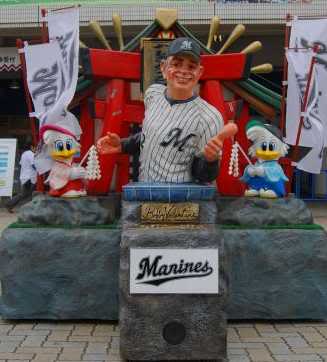
Bobby Valentine may well be the most popular man in Chiba, Japan. In the U.S., he’s probably known more for his bizarre faux-mustache disguise he donned in the dugout after being ejected from a 1999 Mets-Blue Jays game — he’s more the punchline to a joke than a revered baseball mind. But in Chiba, that’s exactly what he is. Instead of the players, Valentine is the star, and the Japanese, well-known for their distrust of outsiders, have embraced this very American manager.
In the outfield seats, ardent Marines supporters unfurl huge banners and chant songs praising his name. Concession stands sell everything from Bobby Burgers to Bobby Bento. Spend even a few minutes in Marine Stadium, and you’ll feel the universal love toward Bobby Valentine.
But these same fans might not be as receptive to a foreigner in their stadium not named Bobby Valentine. Why do I know this? Because I was one of the foreigners in Marine Stadium the other night.
Marine Stadium’s actually right by Tokyo Game Show’s Makuhari Messe convention center, and since I’m a huge baseball fan, I thought it’d be the perfect way to spend a post-TGS evening — in part because I wanted to see the fans’ reaction to Valentine.
 I was impressed with the admiration and respect the fans showed Valentine, but I wasn’t quite as impressed with the lack of respect at least a couple of fans showed toward a certain other foreigner in the stadium. The first incident occurred when I accidentally took the wrong seat at the beginning of the game — much to the chagrin of an elderly Japanese couple: “Of course it’s a foreigner who’s sitting in my seat!” Never mind that it was the Marines’ own attendants who led me to that seat in the first place! (And elderly Japanese are, like their World War II generation American counterparts, not always the best examples of their country’s attitudes.)
I was impressed with the admiration and respect the fans showed Valentine, but I wasn’t quite as impressed with the lack of respect at least a couple of fans showed toward a certain other foreigner in the stadium. The first incident occurred when I accidentally took the wrong seat at the beginning of the game — much to the chagrin of an elderly Japanese couple: “Of course it’s a foreigner who’s sitting in my seat!” Never mind that it was the Marines’ own attendants who led me to that seat in the first place! (And elderly Japanese are, like their World War II generation American counterparts, not always the best examples of their country’s attitudes.)
That wasn’t the last weirdly anti-foreign comment I heard on the night, though. As I moved to my proper seat, I overheard a young woman questioning what I was doing at the game. When her companion pointed out that a foreigner was managing the very team she was rooting for, she didn’t bat an eyelid. “Well, yeah…but that’s different!”
As I exited the stadium, I spotted a few other foreigners — some blond-haired Americans were far more conspicuous than me — so I’m not quite sure why that woman viewed me as such an oddity. From Leonardo DiCaprio to Tommy Lee Jones, foreigners are hardly strangers to the Japanese public. Hell, these days, they’re hardly strangers on the streets of Tokyo — I submit that it’s impossible to go a whole day without seeing a foreigner…or, for that matter, 10 of them. But despite their increasing presence in Japanese society, you can’t escape a simple fact: You’re simply a guest in their society, and that’s all you’ll likely ever be.
 Unless you’re a Gaijin Genius like Bobby Valentine.
Unless you’re a Gaijin Genius like Bobby Valentine.
Despite their well-recorded xenophobia, Japan also has a long tradition of the “exception” to the normal rule of the gaijin-as-outsider. But it takes an extraordinary situation to create a power vacuum where the foreigner will be the accepted option — and the Chiba Lotte Marines were one such situation. Unlike powerful Japanese teams like the Yomiuri Giants, the Marines hadn’t won a championship since the early ’70s, so they took take a chance on Valentine in 2004. And that risky moved paid off, as Valentine led the Marines to a surprise 2005 championship.
One of the earliest examples of the Gaijin Genius was Professor William S. Clark, who helped form one of Japan’s first universities during the Meiji Restoration. To this day, Clark is well-known in Japan but somewhat obscure in America. Brazilian soccer star Zico is another example. As a player, he helped launch Japan’s then-nascent J-League with great fanfare, and he became so beloved that he wound up coaching the Japanese national soccer team in the 2006 World Cup.
One area I haven’t seen this phenomenon, though, is gaming. Sure, the Japanese respect certain Western creators like Will Wright and Peter Molyneux, and you have the rare mid-level producer like Capcom’s Ben Judd, but I can’t think of a foreigner who’s become the “savior” of a company and a hero of the Japanese gaming public on the level of Valentine or Zico. But that’s probably partly because, up until recently, Japanese game companies had been relatively stable for decades. Could the recession and downturn in Japanese gaming actually force Japanese companies to take a chance on foreign leadership?
Oh, and an addendum: Even the Gaijin Genius isn’t immune from Japanese racism. The Marines recently changed to a new, far more conservative ownership group — one that doesn’t like the idea of an American manager. As a result, this week will actually be Bobby Valentine’s last as manager of the Chiba Lotte Marines. Seems that even the admiration of thousands of fans and a championship can’t overcome xenophobia at the corporate level.



